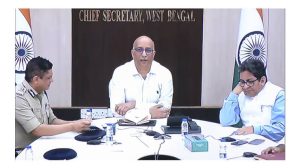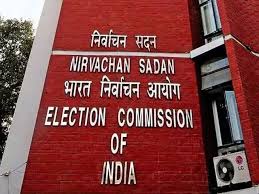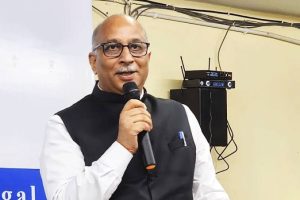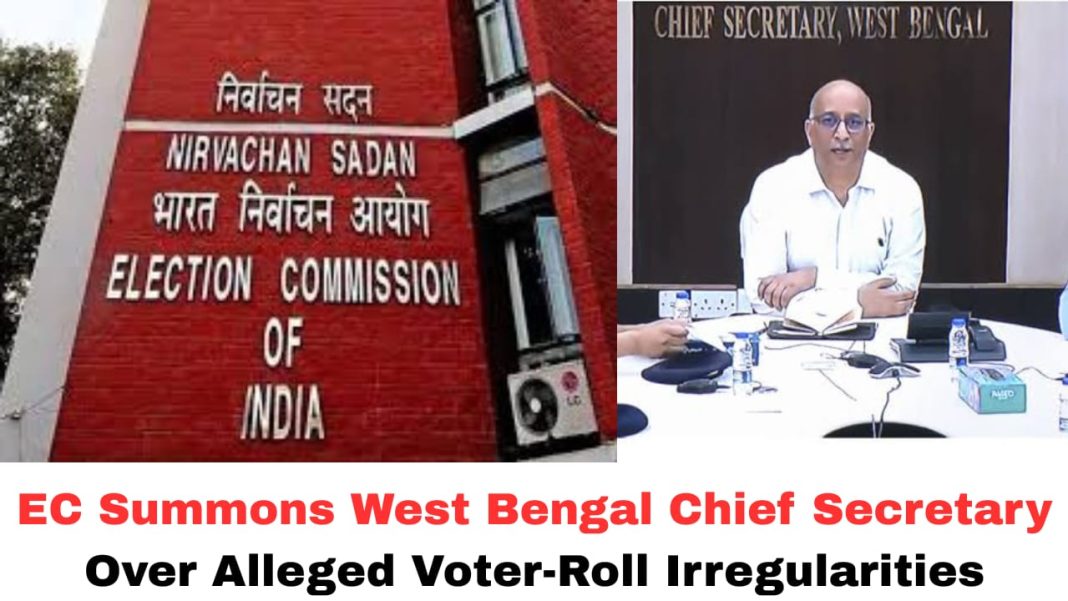Digital News Guru West Bengal Desk:
ECI Summons West Bengal Chief Secretary: A Clash Over Electoral Integrity
In a striking assertion of authority, the Election Commission of India (ECI) has summoned West Bengal Chief Secretary Manoj Pant to appear in person at its headquarters, Nirvachan Sadan, New Delhi, by 5 p.m. on Wednesday, August 13, 2025. This marks a crucial flashpoint in the escalating confrontation between the central election authority and the Mamata Banerjee-led West Bengal government over alleged electoral irregularities.

Allegations of Fake Voter Entries and Data Breaches
On August 5, the ECI issued stern directives to suspend four election officials—two Electoral Registration Officers (EROs) and two Assistant EROs (AEROs)—and a data entry operator. These officials were implicated in fraudulent additions to the electoral rolls and compromising data security protocols by sharing login credentials with unauthorized individuals. The ECI also demanded that FIRs be lodged against them and that departmental inquiries be initiated under Section 32 of the Representation of the People Act, 1950.
The implicated officers include:
- Debottam Dutta Choudhury (ERO, Baruipur Purba)
- Tathagata Mondal (AERO, Baruipur Purba)
- Biplab Sarkar (ERO, Moyna)
- Sudipta Das (AERO, Moyna)
- Surojit Halder (Data entry operator, Baruipur Purba)
The investigation followed allegations of the wrongful registration of 127 voters using forged documents across the Baruipur Purba and Moyna assembly constituencies.
State Government’s Response: Defiance or Deliberation?
In contrast to the ECI’s demands, the West Bengal government acted only partially. On Monday, Chief Secretary Manoj Pant reported withdrawing only two individuals—AERO Sudipta Das and data operator Surojit Halder—from election-related duties. He stopped short of suspending the remaining officials.
Pant justified the limited action by characterizing immediate suspensions and criminal proceedings as “disproportionately harsh”. He warned that such measures could “demoralise” a bureaucracy that, in his assessment, had “consistently demonstrated sincerity and competence.” Moreover, he highlighted the operational reality that district officials often delegate duties in good faith due to overlapping responsibilities.

This response followed a deadline imposed by the ECI. A reminder letter dated August 8, signed by ECI Secretary Sujeet Kumar Mishra, demanded compliance by 3 p.m. on August 11; it noted the absence of any action.
Adding further context, state bureaucrats expressed internal pressure from the WBCS (Executive) Officers’ Association, which urged Chief Secretary Pant to intervene on behalf of the accused officers.
Political Undercurrents and the Stakes Involved
The conflict goes beyond administrative procedure—it carries significant political weight. Chief Minister Mamata Banerjee has questioned not just the ECI’s directives but also its jurisdiction, accusing the body of acting under political influence to “intimidate state government officers”.
From the ECI’s standpoint, its actions underscore the primacy of electoral integrity and the imperative of immediate and transparent accountability. Officials involved in the electoral roll process remain subject to the ECI’s superintendence during election work, reinforcing its right to enforce disciplinary or legal measures.
On the other hand, the West Bengal government defends its approach as measured and procedural, aimed at balancing administrative morale with thorough inquiry-based accountability.
What Lies Ahead
Chief Secretary Pant’s scheduled appearance before the ECI on August 13 will be decisive. The commission’s response—whether to accept Pant’s justification or escalate the matter—could recalibrate the balance of power between state and central institutions.

Possible scenarios include:
- Acceptance with caveats, allowing the inquiry to proceed with partial sanctions.
- Rejection of state reasoning, leading to firmer action—possibly central intervention in the state’s election machinery.
- Further legal escalation, including contempt proceedings or referrals to oversight bodies.
The broader ramifications are substantial: how India’s federal democratic framework handles such administrative disputes will have lasting implications for electoral governance, institutional integrity, and state-center relations.
You May Also Read: Jaipur CMO Bomb Threat Hoax: 50-Year-Old Arrested Within an Hour








